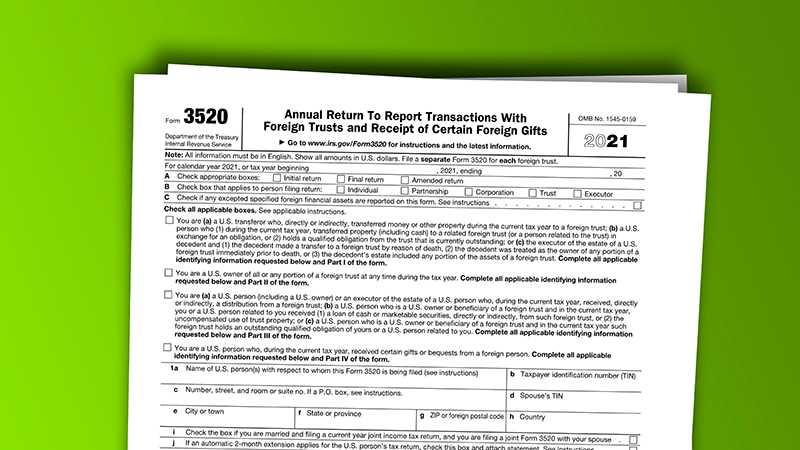Understanding the Importance of Coverage Foreign Inheritance to IRS for Tax Obligation Conformity
Steering the complexities of foreign inheritance calls for a clear understanding of IRS reporting responsibilities. Several individuals take too lightly the importance of accurately reporting these properties, which can cause unintended repercussions. Stopping working to abide by IRS laws may cause large fines and legal complications. It is essential to comprehend the subtleties surrounding foreign inheritances to prevent challenges. The adhering to sections will certainly clear up critical elements of conformity and the possible risks involved.

What Constitutes Foreign Inheritance?
When a specific receives assets from a deceased person's estate located outside of the United States, this transfer is taken into consideration a foreign inheritance. Foreign inheritances can include various types of assets such as property, checking account, investments, individual items, and business interests. The worth and nature of these properties might vary considerably depending on the laws and custom-mades of the country in which the estate is located.
Additionally, the process of obtaining these properties can entail steering via international lawful systems, which may impose particular requirements or tax obligations connected to inheritance. The recipient might additionally encounter difficulties in figuring out the reasonable market worth of the acquired assets, particularly if they are not acquainted with the local real estate or financial markets. Understanding what constitutes an international inheritance is crucial for individuals to ensure conformity with both regional laws and any kind of possible responsibilities they may have in their home nation.
IRS Reporting Requirements for Foreign Inheritance
Exactly how does one steer through the IRS coverage requirements for international inheritance? Individuals that obtain an inheritance from abroad must recognize particular reporting responsibilities to guarantee compliance with IRS regulations. The Foreign Financial Institution and Financial Accounts Report (FBAR) is one important need; if the overall worth of foreign accounts goes beyond $10,000 at any moment throughout the year, it should be reported. In addition, Type 3520 might be required for reporting international gifts or inheritances over $100,000 from non-U.S. individuals. This form captures information regarding the inheritance, consisting of the source and quantity. Failing to adhere to these coverage needs can lead to substantial fines. It is important for recipients to maintain complete records of the inheritance, including any type of documentation from foreign entities. Consulting with a tax professional well-informed about global tax laws can supply additional advice in steering with these reporting responsibilities efficiently.
Tax Ramifications of Getting an Inheritance From Abroad
Obtaining an inheritance from abroad can carry considerable tax obligation effects for people, particularly as they browse the complexities of international tax legislations. The IRS needs U.S. citizens and residents to report foreign inheritances, which may activate various tax responsibilities - reporting foreign inheritance to IRS. Although inheritances themselves are usually ruled out gross income, reporting is crucial to avoid penalties
In addition, the estate may be subject to estate taxes in the international country, which might affect the net value obtained by the beneficiary. If the inheritance includes foreign assets, such as property or financial investments, they might include distinct tax considerations, including possible resources gains taxes upon sale.
Moreover, individuals may require to adhere to foreign tax regulations, which can vary markedly from united state regulations. Recognizing these ramifications is vital for correct tax compliance and to assure that all responsibilities are fulfilled without sustaining lawful problems or unneeded prices.
Typical Blunders to Prevent When Reporting Inheritance

Steps to Guarantee Compliance With IRS Laws
Comprehending the steps essential to assure conformity with IRS laws is essential for any person reporting an international inheritance. People need to validate whether the inheritance goes beyond the reporting limit, which can activate extra demands. Next, it is vital to collect all appropriate paperwork, including the will, trust records, and documents of the foreign estate's value.
Submitting Kind 3520, which especially attends to foreign gifts and inheritances, is necessary to inform the Click Here IRS of the inheritance. People have to likewise make sure that any applicable tax obligations associated with the inheritance are paid, including potential inheritance tax in the foreign jurisdiction.
Additionally, maintaining precise records of all communications and deals relating to the inheritance can offer necessary assistance in case of an internal revenue service query. Seeking specialist guidance from a tax obligation consultant accustomed to global tax laws can additionally enhance conformity and mitigate threats associated with reporting foreign inheritances.
Regularly Asked Questions

What Takes place if I Fail to Record My Foreign Inheritance?
Failing to report a foreign inheritance can bring about substantial charges, interest on overdue taxes, and possible lawful consequences. The IRS might go after enforcement actions, making complex future monetary transactions and conformity responsibilities for the individual entailed.
Can I Deduct Expenditures Associated to Finding Foreign Inheritance?
No, expenditures associated to obtaining a foreign inheritance are generally not insurance deductible for tax functions. Inheritance itself is generally not taken into consideration taxable earnings, and linked costs can not be asserted to decrease tax obligation liability.
Exist Penalties for Late Reporting of Foreign Inheritance?
Yes, there are fines for late coverage of international inheritance to the IRS - IRS Form 3520 inheritance. These can include penalties and rate of interest on overdue taxes, making prompt disclosure vital for conformity and avoiding extra economic burdens
Exactly How Does Foreign Inheritance Influence My State Tax Obligations?
Foreign inheritance may affect state tax obligations differently depending upon territory. Some states enforce inheritance or estate taxes, while others do not. It is vital to get in touch with local policies to identify certain tax obligation effects connected to foreign inheritance.

Are Gifts From Abroad Thought About Foreign Inheritance for IRS Purposes?
Presents from abroad are not this contact form classified as international inheritance for IRS objectives. foreign gift tax reporting requirements. Rather, they are treated individually under present tax obligation regulations, with different reporting demands and limits that people must adhere to for conformity
In addition, the process of image source obtaining these possessions can entail maneuvering with international legal systems, which may enforce certain demands or taxes associated to inheritance. The Internal revenue service calls for United state citizens and residents to report international inheritances, which might cause different tax obligation commitments. Sending Type 3520, which especially addresses foreign gifts and inheritances, is vital to notify the Internal revenue service of the inheritance. Stopping working to report an international inheritance can lead to considerable charges, rate of interest on unsettled tax obligations, and prospective legal repercussions. No, expenses related to obtaining an international inheritance are usually not insurance deductible for tax obligation functions.